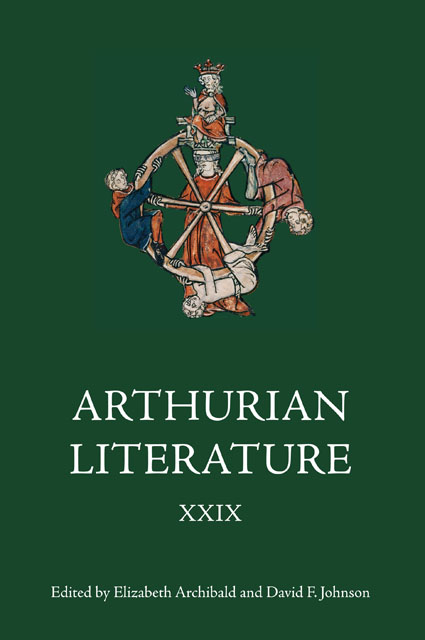Book contents
- Frontmatter
- Contents
- List of Illustrations
- General Editors’ Foreword
- List of Contributors
- I Edward III’s Abandoned Order of the Round Table
- II King Arthur’s Tomb at Glastonbury: The Relocation of 1368 in Context
- III Benedict of Gloucester’s Vita Sancti Dubricii: An Edition and Translation
- IV New Evidence for an Interest in Arthurian Literature in the Dutch Low Countries in the Fifteenth and Early Sixteenth Centuries
- V Malory’s Source-Manuscript for the First Tale of Le Morte Darthur
- VI Malory’s Sources – and Arthur’s Sisters – Revisited
- VII Peace, Justice and Retinue-Building in Malory’s ‘The Tale of Sir Gareth of Orkney’
- VIII Mapping Malory’s Morte: The (Physical) Place and (Narrative) Space of Cornwall
- IX The Fringes of Arthurian Fiction
- Contents of Previous Volumes
VI - Malory’s Sources – and Arthur’s Sisters – Revisited
Published online by Cambridge University Press: 14 February 2023
- Frontmatter
- Contents
- List of Illustrations
- General Editors’ Foreword
- List of Contributors
- I Edward III’s Abandoned Order of the Round Table
- II King Arthur’s Tomb at Glastonbury: The Relocation of 1368 in Context
- III Benedict of Gloucester’s Vita Sancti Dubricii: An Edition and Translation
- IV New Evidence for an Interest in Arthurian Literature in the Dutch Low Countries in the Fifteenth and Early Sixteenth Centuries
- V Malory’s Source-Manuscript for the First Tale of Le Morte Darthur
- VI Malory’s Sources – and Arthur’s Sisters – Revisited
- VII Peace, Justice and Retinue-Building in Malory’s ‘The Tale of Sir Gareth of Orkney’
- VIII Mapping Malory’s Morte: The (Physical) Place and (Narrative) Space of Cornwall
- IX The Fringes of Arthurian Fiction
- Contents of Previous Volumes
Summary
In volume 26 of Arthurian Literature, Jonathan Passaro claimed that Cambridge University Library, Additional 7071 is very likely to be the actual manuscript of the Suite du Merlin used by Malory. Details of the case he makes for the text of the Suite itself form part of the examination by P. J. C. Field in his contribution to the present volume, and in this article I would like to establish whether Passaro’s findings hold for the earlier part of the Merlin story. The material on which I shall concentrate precedes a division that is not always sufficiently acknowledged in discussion of the cycles which form the background to Malory’s knowledge, and of the manuscripts in which they are contained. In the course of my investigation, details will emerge that I hope will contribute to the wider study both of Malory’s source material and of the Merlin manuscript tradition.
Each manuscript of the Vulgate or Post-Vulgate Merlin begins with the story of the sage as told in the Robert de Boron cycle, of which some exemplars would have had no continuation, while others would have contained the full cycle with the Perceval. In addition to the repeated copying of individual cycles, the number of manuscripts with what I shall call the ‘old Merlin’ would have increased each time a new continuation was produced. The result would have been a great many copies in circulation and a great many opportunities either for discrepancy, or for revision when old and new parts of the story were brought together.
Decorated initials are used sparingly in the Cambridge manuscript: an ornate M to mark the opening of the old Merlin section (fol. 158va, following a Vulgate Estoire del Saint Graal), and a C or an O to introduce and emphasize ‘Ci endroit di li contes’ or ‘Or dit li contes’. The old Merlin portion of the text ends, in Cambridge as in most other manuscripts, with Arthur’s coronation and the statement that he held the realm for a long time in peace, and the opening of the Suite is then marked by a decorated capital C to introduce the statement ‘Ci endroit dit li contes’(fol. 202rb). In other words, the division is linked to a reference to an authority, rather than providing us with any information about a possible change of model.
- Type
- Chapter
- Information
- Arthurian Literature XXIX , pp. 121 - 142Publisher: Boydell & BrewerPrint publication year: 2012



